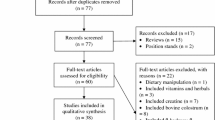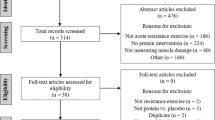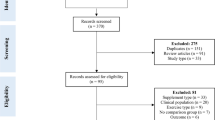Abstract
Background
Protein supplements are frequently consumed by athletes and recreationally-active individuals, although the decision to purchase and consume protein supplements is often based on marketing claims rather than evidence-based research.
Objective
To provide a systematic and comprehensive analysis of literature examining the hypothesis that protein supplements enhance recovery of muscle function and physical performance by attenuating muscle damage and soreness following a previous bout of exercise.
Data Sources
English language articles were searched with PubMed and Google Scholar using protein and supplements together with performance, exercise, competition and muscle, alone or in combination as keywords.
Study Selection
Inclusion criteria required studies to recruit healthy adults less than 50 years of age and to evaluate the effects of protein supplements alone or in combination with carbohydrate on performance metrics including time-to-exhaustion, time-trial or isometric or isokinetic muscle strength and markers of muscle damage and soreness. Twenty-seven articles were identified of which 18 dealt exclusively with ingestion of protein supplements to reduce muscle damage and soreness and improve recovery of muscle function following exercise, whereas the remaining 9 articles assessed muscle damage as well as performance metrics during single or repeat bouts of exercise.
Study Appraisal and Synthesis Methods
Papers were evaluated based on experimental design and examined for confounders that explain discrepancies between studies such as dietary control, training state of participants, sample size, direct or surrogate measures of muscle damage, and sensitivity of the performance metric.
Results
High quality and consistent data demonstrated there is no apparent relationship between recovery of muscle function and ratings of muscle soreness and surrogate markers of muscle damage when protein supplements are consumed prior to, during or after a bout of endurance or resistance exercise. There also appears to be insufficient experimental data demonstrating ingestion of a protein supplement following a bout of exercise attenuates muscle soreness and/or lowers markers of muscle damage. However, beneficial effects such as reduced muscle soreness and markers of muscle damage become more evident when supplemental protein is consumed after daily training sessions. Furthermore, the data suggest potential ergogenic effects associated with protein supplementation are greatest if participants are in negative nitrogen and/or energy balance.
Limitations
Small sample numbers and lack of dietary control limited the effectiveness of several investigations. In addition, studies did not measure the effects of protein supplementation on direct indices of muscle damage such as myofibrillar disruption and various measures of protein signaling indicative of a change in rates of protein synthesis and degradation. As a result, the interpretation of the data was often limited.
Conclusions
Overwhelmingly, studies have consistently demonstrated the acute benefits of protein supplementation on post-exercise muscle anabolism, which, in theory, may facilitate the recovery of muscle function and performance. However, to date, when protein supplements are provided, acute changes in post-exercise protein synthesis and anabolic intracellular signaling have not resulted in measureable reductions in muscle damage and enhanced recovery of muscle function. Limitations in study designs together with the large variability in surrogate markers of muscle damage reduced the strength of the evidence-base.

Similar content being viewed by others
References
Erdman KA, Fung TS, Reimer RA. Influence of performance level on dietary supplementation in elite Canadian athletes. Med Sci Sports Exerc. 2006;38:349–56.
Lieberman HR, Stavinoha TB, Mcgraw SM, et al. Use of dietary supplements among active-duty U.S. Army soldiers. Am J Clin Nutr. 2010;92:985–95.
Petroczi A, Naughton CP. The age-gender-status profile of high performing athletes in the UK taking nutritional supplements: lessons for the future. J Int Soc Sports Nutr. 2008;5:2.
Pasiakos SM, Montain SJ, Young AJ. Protein supplementation in U.S. Military personnel. J Nutr. 2013;143:1815S–9S.
Erdman KA, Fung TS, Doyle-Baker PK, et al. Dietary supplementation of high-performance Canadian athletes by age and gender. Clin J Sport Med. 2007;17:458–64.
Clarkson PM, Nosaka K, Braun B. Muscle function after exercise-induced muscle damage and rapid adaptation. Med Sci Sports Exerc. 1992;5:512–20.
Biolo G, Maggi SP, Williams BD, et al. Increased rates of muscle protein turnover and amino acid transport after resistance exercise in humans. Am J Physiol. 1995;268:E514–20.
Pitkänen HT, Knuutinen J, Lahti K, et al. Free amino acid pool and muscle protein balance after resistance exercise. Med Sci Sports Exerc. 2003;35:784–92.
Phillips SM, Tipton DD, Aarsland A, et al. Mixed muscle protein synthesis and breakdown after resistance exercise in humans. Am J Physiol. 1997;273:E99–107.
Levenhagen DK, Carr C, Carlson MG, et al. Postexercise protein intake enhances whole-body and leg protein accretion in humans. Med Sci Sports Exerc. 2002;34:828–37.
Koopman R, Wagenmakers AJM, Manders RJF, et al. Combined ingestion of protein and free leucine with carbohydrate increases postexercise muscle protein synthesis in vivo in male subjects. Am J Physiol. 2005;288:E645–53.
Tipton KD, Ferrando AA, Phillips SM, et al. Postexercise net protein synthesis in human muscle from orally administered amino acids. Am J Physiol. 1999;276:E628–34.
Biolo G, Tipton KD, Klein S, et al. An abundant supply of amino acids enhances the metabolic effect of exercise on muscle protein. Am J Physiol. 1997;273:E122–9.
Rasmussen BB, Tipton KD, Miller SL, et al. An oral essential amino acid-carbohydrate supplement enhances muscle protein anabolism after resistance exercise. J Appl Physiol. 2000;88:386–92.
Lunn WR, Pasiakos SM, Colletto MR, et al. Chocolate milk and endurance exercise recovery: protein balance, glycogen, and performance. Med Sci Sports Exerc. 2012;44:682–91.
Nelson AR, Phillips SM, Stellingwerff T, et al. A protein-leucine supplement increases branched-chain amino acid and nitrogen turnover but not performance. Med Sci Sports Exerc. 2012;44:57–68.
Wilkinson SB, Phillips SM, Atherton PJ, et al. Differential effects of resistance and endurance exercise in the fed state on signalling molecule phosphorylation and protein synthesis in human muscle. J Physiol. 2008;586:3701–17.
Breen L, Philip A, Witard OC, et al. The influence of carbohydrate–protein co-ingestion following endurance exercise on myofibrillar and mitochondrial protein synthesis. J Physiol. 2011;589:4011–25.
Howarth KR, Moreau NA, Phillips SM, et al. Coingestion of protein with carbohydrate during recovery from endurance exercise stimulates skeletal muscle protein synthesis in humans. J Appl Physiol. 2009;106:1394–402.
Moore DR, Stellingwerff T. Protein ingestion after endurance exercise: the ‘evolving’ needs of the mitochondria? J Physiol. 2012;590:1785–6.
Hulston CJ, Wolsk E, Grøndahl TS, et al. Protein intake does not increase vastus lateralis muscle protein synthesis during cycling. Med Sci Sports Exerc. 2011;43:1635–42.
Saunders MJ. Coingestion of carbohydrate–protein during endurance exercise: influence on performance and recovery. Int J Sport Nutr Exerc Metab. 2007;17:S87–103.
Ebell MH, Siwek J, Weiss BD, et al. Strength of recommendation taxonomy (SORT): A patient-centered approach to grading evidence in the medical literature. Am Family Phys. 2004;69(3):548–56.
Institute of Medicine. Dietary reference intakes for energy, carbohydrate, fiber, fat, fatty acids, cholesterol, protein, and amino acids. Washington, D.C.: The National Academies Press; 2005.
Macdermid PW, Stannard SR. A whey-supplement, high-protein diet versus a high-carbohydrate diet: effects on endurance cycling performance. Int J Sport Nutr Exerc Metab. 2006;16:65–77.
Witard OC, Jackman SR, Kies AK, et al. Effect of increased dietary protein on tolerance to intensified training. Med Sci Sports Exerc. 2011;43:598–607.
Bird SP, Tarpenning KM, Marino FE. Liquid carbohydrate/essential amino acid ingestion during a short-term bout of resistance exercise suppresses myofibrillar protein degradation. Metabolism. 2006;55:570–7.
Coombes JS, McNaughton LR. Effects of branched chain amino acid supplementation on serum creatine kinase and lactate dehydrogenase after prolonged exercise. J Sports Med Phys Fitness. 2000;40:240–6.
Matsumoto K, Koba T, Hamada K, et al. Branched-chain amino acid supplementation attenuates muscle soreness, muscle damage and inflammation during an intensive training program. J Sports Med Phys Fitness. 2009;49:424–31.
Shimomura Y, Yamamoto Y, Bajotto G, et al. Nutraceutical effects of branched-chain amino acids on skeletal muscle. J Nutr. 2006;136:529S–32S.
Luden ND, Saunders MJ, Todd MK. Postexercise carbohydrate–protein–antioxidant ingestion decreases plasma creatine kinase and muscle soreness. Int J Sport Nutr Exerc Metab. 2007;17:109–23.
Pivarnik JM, Hickson JF, Wolisnky I. Urinary 3-methylhistidine excretion increases with repeated weight training exercise. Med Sci Sports Exerc. 1989;21:283–7.
Saunders MJ, Kane MD, Todd KM. Effects of a carbohydrate–protein beverage on cycling endurance and muscle damage. Med Sci Sports Exerc. 2004;36:1233–8.
Romano-Ely BC, Todd MK, Saunders MJ, et al. Effect of an isocaloric carbohydrate–protein–antioxidant drink on cycling performance. Med Sci Sports Exerc. 2006;38:1608–16.
Cermak NM, Solheim AS, Gardner MSL, et al. Muscle metabolism during exercise with carbohydrate or protein–carbohydrate ingestion. Med Sci Sports Exerc. 2009;41:2158–64.
Breen L, Tipton KD, Jeukendrup AE. No effect of carbohydrate–protein on cycling performance and indices of recovery. Med Sci Sports Exerc. 2010;42:1140–8.
Valentine RJ, Saunders MJ, Todd MK, et al. Influence of carbohydrate–protein beverage on cycling endurance and indices of muscle disruption. Int J Sport Nutr Exerc Metab. 2008;18:363–78.
Ferguson-Stegall L, McCleave EL, Ding Z, et al. Postexercise carbohydrate–protein supplementation improves subsequent exercise performance and intracellular signaling for protein synthesis. J Strength Cond Res. 2011;25:2110–224.
Rowlands DS, Thorp RM, Rossler K, et al. Effect of protein-rich feeding on recovery after intense exercise. Int J Sport Nutr Exerc Metab. 2007;17:521–43.
Pritchett K, Bishop P, Pritchett R, et al. Acute effects of chocolate milk and a commercial recovery beverage on postexercise recovery indices and endurance cycling performance. Appl Physiol Nutr Metab. 2009;34:1017–22.
Millard-Stafford M, Warren GL, Thomas LM, et al. Recovery from run training: efficacy of a carbohydrate–protein beverage? Int J Sport Nutr Exerc Metab. 2005;15:610–24.
Buckley JD, Thomson RL, Coates AM, et al. Supplementation with a whey protein hydrolysate enhances recovery of muscle force-generating capacity following eccentric exercise. J Sci Med Sport. 2010;13:178–81.
Greer BK, Woodard JL, White JP, et al. Branched-chain amino acid supplementation and indicators of muscle damage after endurance exercise. Int J Sport Nutr Exerc Metab. 2007;17:595–607.
Green MS, Corona BT, Doyle JA, et al. Carbohydrate–protein drinks do not enhance recovery from exercise-induced muscle injury. Int J Sport Nutr Exerc Metab. 2008;18:1–18.
Etheridge T, Philp A, Watt PW. A single protein meal increases recovery of muscle function following an acute eccentric exercise bout. Appl Physiol Nutr Metab. 2008;33:483–8.
Thompson D, Nicholas CW, Williams C. Muscular soreness following prolonged intermittent high-intensity shuttle running. J Sports Sci. 1999;17:387–95.
Betts JA, Toone RJ, Stokes KA, et al. Systemic indices of skeletal muscle damage and recovery of muscle function after exercise: effect of combined carbohydrate–protein ingestion. Appl Physiol Nutr Metab. 2009;34:773–84.
Blacker SD, Williams NC, Fallowfield JL, et al. Carbohydrate vs protein supplementation for recovery of neuromuscular function following prolonged load carriage. J Int Soc Sports Nutr. 2010;7:2.
Newham DJ, Jones DA, Clarkson PM. Repeated high-force eccentric exercise: effects on muscle pain and damage. J Appl Physiol. 1987;63:1381–6.
Cockburn E, Hayes PR, French DN, et al. Acute milk-based protein-CHO supplementation attenuates exercise-induced muscle damage. Appl Physiol Nutr Metab. 2008;33:775–83.
Jackman SR, Witard OC, Jeukendrup AE, et al. Branched-chain amino acid ingestion can ameliorate soreness from eccentric exercise. Med Sci Sports Exerc. 2010;42:962–70.
Nosaka K, Sacco P, Mawatari K. Effects of amino acid supplementation on muscle soreness and damage. Int J Sport Nutr Exerc Metab. 2006;16:620–35.
White JP, Wilson JM, Austin KG, et al. Effect of carbohydrate–protein supplement timing on acute exercise-induced muscle damage. J Int Soc Sports Nutr. 2008;5:5.
Wojcik JR, Walberg-Rankin J, Smith LL, et al. Comparison of carbohydrate and milk-based beverages on muscle damage and glycogen following exercise. Int J Sport Nutr Exerc Metab. 2001;11:406–19.
Hoffman JR, Ratamess NA, Tranchina CP, et al. Effect of a proprietary protein supplement on recovery indices following resistance exercise in strength/power athletes. Amino Acids. 2010;38:771–8.
Flakoll PJ, Judy T, Flinn K, et al. Postexercise protein supplementation improves health and muscle soreness during basic military training in marine recruits. J Appl Physiol. 2004;96:951–6.
Skillen RA, Testa M, Applegate EA, et al. Effects of an amino acid-carbohydrate drink on exercise performance after consecutive-day exercise bouts. Int J Sport Nutr Exerc Metab. 2008;18:473–92.
Rowlands DS, Rössler K, Thorp RM, et al. Effect of dietary protein content during recovery from high-intensity cycling on subsequent performance and markers of stress, inflammation, and muscle damage in well-trained men. Appl Physiol Nutr Metab. 2008;33:39–51.
Thomson JS, Ali AA, Rowlands DS. Leucine-protein supplemented recovery feeding enhances subsequent cycling-performance in well-trained men. Appl Physiol Nutr Metab. 2011;36:242–53.
Pasiakos SM, McClung JP. Supplemental dietary leucine and the skeletal muscle anabolic response to essential amino acids. Nutr Rev. 2011;69:550–7.
Cathcart AJ, Murgatroyd SR, McNab A, et al. Combined carbohydrate–protein supplementation improves competitive endurance exercise performance in the heat. Eur J Appl Physiol. 2011;111:2051–61.
Sharp CPM, Pearson DR. Amino acid supplements and recovery from high-intensity resistance training. J Strength Cond Res. 2010;24:1125–30.
Nosaka K, Clarkson PM, McGuiggin ME, et al. Time course of muscle adaptation after high-force eccentric exercise. Eur J Appl Physiol. 1991;63:70–6.
Batterham AM, Hopkins WG. Making meaningful inferences about magnitudes. Int J Sports Physiol Perform. 2006;1:50–7.
Hopkins WG, Marshall SW, Batterham AM, et al. Progressive statistics for studies in sports medicine and exercise science. Med Sci Sports Exerc. 2009;41:3–13.
Amann M, Hopkins WG, Marcora SM. Similar sensitivity of time to exhaustion and time-trial time to changes in endurance. Med Sci Sports Exerc. 2008;40:574–8.
Phillips SM, Parise G, Roy BD, et al. Resistance-training-induced adaptations in skeletal muscle protein turnover in the fed state. Can J Physiol Pharmacol. 2002;80:1045–53.
Pikosky MA, Gaine PC, Martin WF, et al. Aerobic exercise training increases skeletal muscle protein turnover in healthy adults at rest. J Nutr. 2006;136:379–83.
Tang JE, Perco JG, Moore DR, et al. Resistance training alters the response of fed state mixed muscle protein synthesis in young men. Am J Physiol. 2008;294:R172–8.
Warren GL, Lowe DA, Armstrong RB. Measurement tools used in the study of eccentric contraction-induced injury. Sports Med. 1999;27:43–59.
Gibala MJ, MacDougall JD, Tarnopolsky MA, et al. Changes in human skeletal muscle ultrastructure and force production after acute resistance exercise. J Appl Physiol. 1995;78:702–8.
Stauber WT, Clarkson PM, Fritz VK, et al. Extracellular matrix disruption and pain after eccentric muscle action. J Appl Physiol. 1990;69:868–74.
Stupka N, Tarnopolsky MA, Yardley NJ, et al. Cellular adaptation to repeated eccentric exercise-induced muscle damage. J Appl Physiol. 2001;91:1669–78.
Børsheim E, Tipton KD, Wolf SE, et al. Essential amino acids and muscle protein recovery from resistance exercise. Am J Physiol. 2002;283:E648–57.
Levenhagen DK, Gresham JD, Carlson MG, et al. Postexercise nutrient intake timing in humans is critical to recovery of leg glucose and protein homeostasis. Am J Physiol. 2001;280:E982–93.
Tipton KD, Rasmussen BB, Miller SL, et al. Timing of amino acid-carbohydrate ingestion alters anabolic response of muscle to resistance exercise. Am J Physiol. 2001;281:E197–206.
Witard OC, Tieland M, Beelen M, et al. Resistance exercise increases postprandial muscle protein synthesis in humans. Med Sci Sports Exerc. 2009;41:144–54.
Tang JE, Moore DR, Kujbida GW, et al. Ingestion of whey hydrolysate, casein, or soy protein isolate: effects on mixed muscle protein synthesis at rest and following resistance exercise in young men. J Appl Physiol. 2009;107:987–92.
Hartman JW, Tang JE, Wilkinson SB, et al. Consumption of fat-free milk after resistance exercise promotes greater lean mass accretion than does consumption of soy or carbohydrate in young, novice, male weightlifters. Am J Clin Nutr. 2007;86:373–81.
Res PT, Groen B, Pennings B, et al. Protein ingestion before sleep improves postexercise overnight recovery. Med Sci Sports Exerc. 2012;44:1560–9.
Drummond MJ, Glynn EL, Fry CS, et al. Essential amino acids increase microRNA-499, -208b, and -23a and downregulate myostatin and myocyte enhancer factor 2C mRNA expression in human skeletal muscle. J Nutr. 2009;139:2279–84.
Drummond MJ, McCarthy JJ, Fry CS, et al. Aging differentially affects human skeletal muscle microRNA expression at rest and after an anabolic stimulus of resistance exercise and essential amino acids. Am J Phys. 2008;295:E1333–40.
Davidsen PK, Gallagher IJ, Hartman JW, et al. High responders to resistance exercise training demonstrate differential regulation of skeletal muscle microRNA expression. J Appl Physiol. 2011;110:309–17.
Acknowledgments
This work was supported by the US Army Medical Research and Materiel Command (USAMRMC) and the Department of Defense Center Alliance for Dietary Supplements Research. The views, opinions and/or findings in this report are those of the authors, and should not be construed as an official Department of the Army position, policy or decision, unless so designated by other official documentation. Citation of commercial organization and trade names in this report do not constitute an official Department of the Army endorsement or approval of the products or services of these organizations.
T.M. McLellan was supported by the Oak Ridge Institute for Science and Education through an interagency agreement between the U.S. Department of Energy and USAMRMC.
The authors have no potential conflicts of interest that are directly relevant to the content of this review.
Author information
Authors and Affiliations
Corresponding author
Rights and permissions
About this article
Cite this article
Pasiakos, S.M., Lieberman, H.R. & McLellan, T.M. Effects of Protein Supplements on Muscle Damage, Soreness and Recovery of Muscle Function and Physical Performance: A Systematic Review. Sports Med 44, 655–670 (2014). https://doi.org/10.1007/s40279-013-0137-7
Published:
Issue Date:
DOI: https://doi.org/10.1007/s40279-013-0137-7




